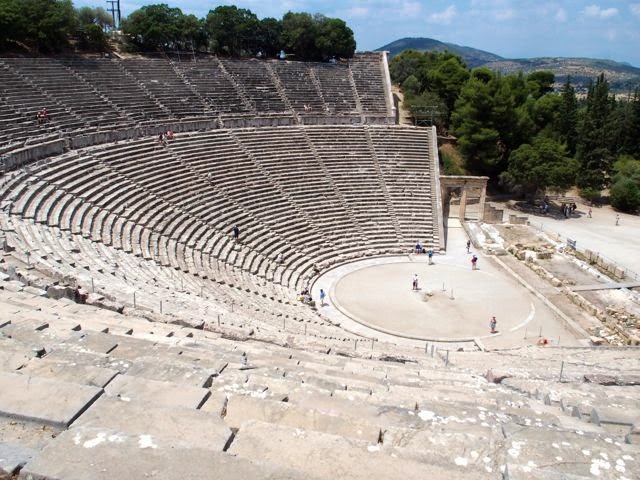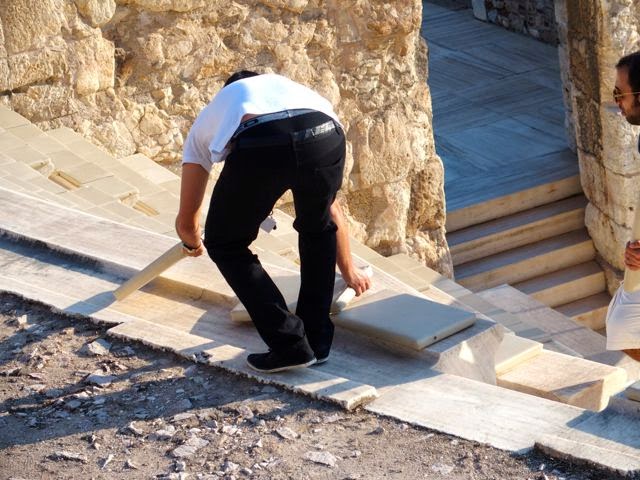 |
| The anchorage on Serifos is far below the old town |
I left you in the middle of the Aegean, mumbling something about unstable systems. We've moved further west, we're down one crew as of yesterday and there's a smattering of foreign attitude on my computer keyboard (alphas, betas, epsilons and the like, of which more later) - but most surprisingly, the air is yet to settle into summer predictability.
 |
| Greece vs Spain |
I suggested to Freddy that he add "Aegean crossing, east to west" to his CV. Surely, I reckoned, it would count for something in the corporate jostle...near enough to a Tough Mudder? He will have his own take on that, but when he jumped ship yesterday morning, bound for Turin, his own mother was anything but tough. A real cry baby.
 |
| Back on the road |
Our route from Naxos to Athens was pretty direct, via Serifos and Poros, and though you wouldn't know it from the inclination of the grinder in the photo below, we had some good fast sailing with moderate to strong winds coming out of the north. A very poor showing on the part of the Greek dolphins however, with only one sighting the whole way across.
 |
| Freddy flat out |
 |
| Enki tracking nicely towards Poros |
In Poros, we tied up alongside on a stretch of public dock which, in a de facto fashion, is the preserve of the charter fleet of Greek Sails, but only if they can keep other boats off it. They were happy to have us parked there until Friday when their boats come in, and in this case, our size worked to our advantage. Doing them a favour really (a nice tip from Bunny and Bill of Onset).
 |
| Yachts and fishing boats on the Poros dockside |
 |
| Looking the part is important for some |
 |
| Navplio, seen from a bastion of the Palamidi fortress |
Poros is just across the water from Galatas at the top of the Peloponnese peninsula. This is Mycenean territory. The stupendous citadel of Agamemnon, who commanded the fleet which sailed to Troy to win back Helen, is just over the hills, the same formidable hills which hold the acoustically perfect theatre of Epidavros. I'd set my heart on seeing both these places. Navpoli, where the Venetians built a fortress which runs down the spine of a steep rocky outcrop like scales on an armadillo's back, was a bonus. It's a town for those in the know, I suspect. Freddy, ever alert to a wifi connection, informed us that the director-general of the BBC lives in Navpoli. Who would have thought?
 |
| Looking up towards Palamida fortress from the lower Akronafplia fortress |
 |
| Venetian lion over the gate of Akronafplia fortress |
 |
| Epidavros was the pre-eminent healing centre of the ancient world |
 |
| The athletics stadium at Epidavros and theatre (below) - part of the cure |
 |
| The Lion Gate at Mycenae |
 |
| The entrance to a subterranean acquaduct in Mycenae |
 |
| The graves at Mycenae emptied of their treasures (below) |
The Poros channel is narrow, but you couldn't pay me to get in that water with its rich notes of raw sewage. To offset the smell, the town has a down-at-heel languorous charm. Ferries, fishing boats, mega-yachts, water taxis.... traffic slides along the channel from early morning till way past midnight. Shades of Venice.
 |
| From the aft deck in the Poros channel |
 |
| On the Acropolis |
And so to Athens where, against all odds, we have been caught out by weather. Yes, I know. It seems improbable, this being mid June and
Enki being tucked inside Zea marina where nothing, you might imagine, could rattle your peace of mind. But on Sunday, it was close, sticky, hot. Clouds were forming, but we didn't pay them enough attention, and didn't close the ports (the side windows) when we left the boat to go into Athens to the Benaki's Piros annexe (for contemporary art).
That inattention is something we deeply regret. As we came out of the gallery, we heard the thunder.
 |
| Resident of the ancient agora of Athens |
The storm was vicious and quick. Alex made record time coming back on the train, but the damage was done. Two computers and a phone found swimming on the nav station table and a lot of rainwater in places where it shouldn't go. One computer and the phone were resuscitated, the other computer is confirmed drowned. Ouch.
 |
| Drying out |
This being Athens, we found a new computer with an English i.e. qwerty keyboard, overlaid with the Greek alphabet. A souvenir. Better than the pictures?
 |
| The temple of Hephaestus in the ancient agora |
 |
| The new Acropolis museum |
 |
| Before the opera at the Odeon of Herodes Attica (and below) |
 |
| Old fisherman watching the World Cup - a regular still at 86 |
 |
| Freddy discusses betting strategy with the bar owner (right) |
Without Freddy around we will probably forget to follow the World Cup. He kept us on our toes. Back to cruising, I guess.
 |
| Raki o'clock |
 |
| Ancient sites are an acquired taste (and below) |
 |
| Here for a moment only |






















































